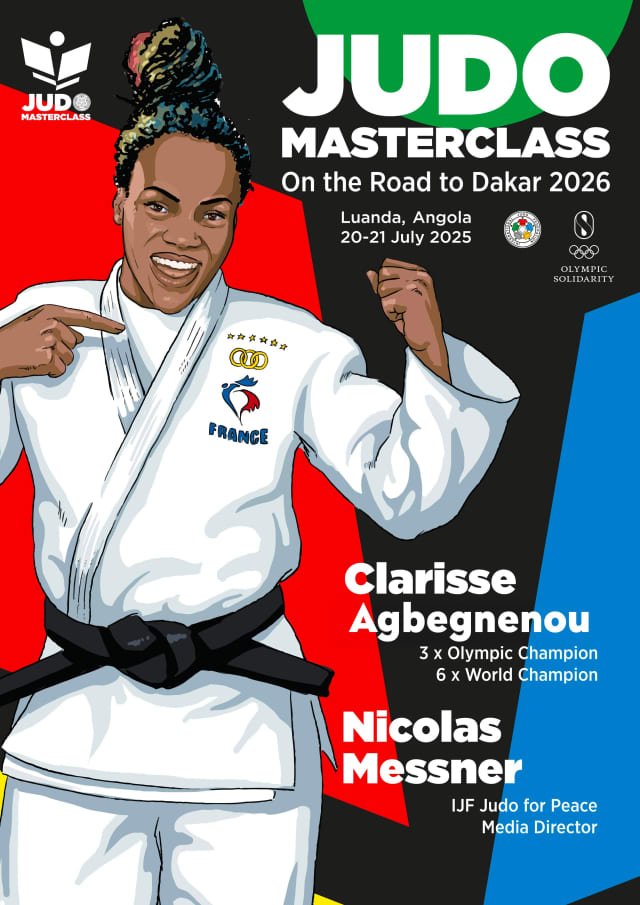Organised by the IJF, with support from Olympic Solidarity and logistical assistance from the African Judo Union and the Angolan Judo Federation, the seminar enabled young cadets, who had taken part in the African Championships, to learn new techniques as practised at the highest level, while also engaging in a values-based approach to the sport.
At the end of two intense days of judo, Clarisse shared, “I’m very happy; it was absolutely amazing! When something like this is organised for the first time, you don’t quite know what to expect, but I certainly wasn’t disappointed, far from it. I didn’t overthink it before arriving in Luanda. I just wanted to share with the young African judoka. In the end, I feel like they shared just as much with me. This trip has been incredibly enriching.
I felt like a fish in water, not out of it! I love people, I love life and being on the African soil of my roots was incredible. I want to thank everyone who thought of me for this mission and made it possible: President Marius Vizer, Larisa Kiss, Vladimir Barta, as well as the leadership of the AJU and the Angolan federation. They were all instrumental in the event’s success.”
It must be said that this masterclass was the result of wide-ranging collaboration and the efforts of everyone involved were rewarded by its outstanding success. AJU President Siteny Randrianasoloniaiko, who was present on site, said, “Everyone agrees that Africa holds enormous development potential, both in sport and in education. A masterclass like this, featuring the very best from the world of judo, can only help strengthen that potential and give our judoka the means to express themselves. Clarisse is a superstar with the power to inspire our future champions. She showed them that nothing comes without hard work, that you have to train diligently while still enjoying what you do. They also discovered how humble she is. It is essential they understand that the future must be built on the foundation of our moral code.
Africa’s history has been shaped by centuries of colonialism. Thanks to Clarisse and Nicolas, I am convinced that our youth can now say to themselves: it is possible, we can do it too, and we will do it!”
Nicolas Messner’s presence, as leader of the technical sessions and speaker on the values of judo, was also a great support for Clarisse, “I want to thank him. He experiences intense and fluid moments around the world through judo. He helped me enter into that same intensity and fluidity. It feels like a new path is opening up for me. I have a lot to learn from others and from myself as well. This Angolan trip really opened my eyes.”
For Nicolas, the choice was clear, “Clarisse was the best possible choice. Her story, her journey, her achievements in the sport, and her stature as a judo star, not to mention her big heart that beats for Africa, made her the ideal person to engage with the 150 cadets on the tatami. What’s even more striking is her humility and her natural ability to connect with people at their level. It’s a genuine pleasure to share moments of sport and education with her.”
By all accounts, the masterclass was a resounding success. Clarisse concluded, “I can say that this first edition was intense and deeply enriching. We really emphasised the importance of respect and I was pleasantly surprised by the level of interest our sessions generated. The judoka simply wanted to learn, they were curious and eager. There was so much attentiveness and I sometimes felt as though they were holding their breath to catch the smallest detail.
We Africans sometimes have a tendency to undervalue ourselves but we have strengths, even though people often talk only about our weaknesses. I noticed, for instance, that these young athletes don’t need weight training; they already have the strength. What they need is support, structured training programmes and discipline. If we bring all of those elements together, there’s no reason African judo can’t explode onto the world stage.”
President Randrianasoloniaiko agreed, “During the African Cadet Championships held just before the masterclass, the judoka were in competition mode, focused on winning. Then came the medal ceremonies. Some stood on the podium, others didn’t. But during the seminar, everyone was back on an equal footing. It was beautiful to see. We need to offer more formats like this, combining competition with educational seminars.
I want to warmly thank President Vizer for making this event possible. This year and next, we have several games taking place on the continent and opportunities like this are truly precious.”
One thing is certain: in 2026, Africa will host the first Olympic Games in its history. These will be the Youth Olympic Games, to be held in Dakar. Some of the participants from the Luanda masterclass will march and compete in Senegal next October. There is no doubt that the seeds planted in Luanda over these few days will grow quickly and nurture a new generation of African champions.












